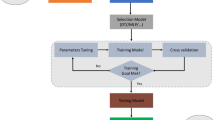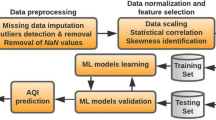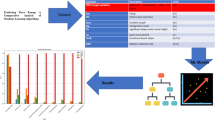Abstract
Global warming and unprecedented human impacts causing environmental degradation are taking place at an alarming rate. As one of the most valuable and important water resources that provides countless benefits to the ecosystem and residents, lakes are highly exposed to such threats. To better manage these precious resources, one of the most underlying steps in this field is accurate forecasting of the lake water level. In this study, the Reduced Error Pruning Tree (RT) model as one of the successful algorithms of machine learning coupled with three ensemble algorithms including Bagging (Ba), Random Committee (RC), and Random Subspace (RSS) were used to predict the monthly water level changes in Lake Urmia. Also, since the role of data analysis is very important for predicting the future state of the lake water level, two methods including Principal component analysis (PCA) and Sequential feature selection (SFS) were used to find the best input combination for model training. The analysis of the results showed that between the dimensionality reduction approaches, SFS presented better results than PCA. In addition, the Bagging and Random Committee ensemble algorithms typically performed better than the standalone models. Among all models developed in this study, the Ba-RT model based on SFS implemented with 2 months of lag times’ inputs (R = 0.99788, EVS = 0.99576, NSE = 0.99576, MAE = 0.10961, and RMSE = 0.14742) showed the best performance compared to the other models.


Source: USGS Landsat Missions Gallery, U.S. Department of the Interior/U.S. Geological Survey)









Similar content being viewed by others
Data availability
The datasets generated during and/or analysed during the current study are available from the corresponding author on reasonable request.
References
Abdi H, Williams LJ (2010) Principal component analysis. WIREs Comput Stat 2:433–459. https://doi.org/10.1002/wics.101
Aggrawal R, Pal S (2020) Sequential feature selection and machine learning algorithm-based patient’s death events prediction and diagnosis in heart disease. SN Comput Sci 1:1–16. https://doi.org/10.1007/s42979-020-00370-1
AghaKouchak A et al (2015) Aral Sea syndrome desiccates Lake Urmia: call for action. J Great Lakes Res 41:307–311. https://doi.org/10.1016/j.jglr.2014.12.007
Ahmady-Birgani H et al (2020) On the chemical nature of wet deposition over a major desiccated lake: case study for Lake Urmia basin. Atmos Res 234:104762. https://doi.org/10.1016/j.atmosres.2019.104762
Alizamir M et al (2020) A novel method for lake level prediction: deep echo state network. Arab J Geosci 13:1–18. https://doi.org/10.1007/s12517-020-05965-9
Altunkaynak A (2014) Predicting water level fluctuations in Lake Michigan-Huron using wavelet-expert system methods. Water Resour Manag 28:2293–2314. https://doi.org/10.1007/s11269-014-0616-0
Altunkaynak A (2019) Predicting water level fluctuations in lake van using hybrid season-neuro approach. J Hydrol Eng 24:04019021. https://doi.org/10.1061/(ASCE)HE.1943-5584.0001804
Barzegar R, Aalami MT, Adamowski J (2021) Coupling a hybrid CNN-LSTM deep learning model with a boundary corrected maximal overlap discrete wavelet transform for multiscale lake water level forecasting. J Hydrol 598:126196. https://doi.org/10.1016/j.jhydrol.2021.126196
Bershadskii A (2013) Nonlinear problems of complex natural systems: sun and climate dynamics. Philos Trans R Soc A Math Phys Eng Sci 371:20120168. https://doi.org/10.1098/rsta.2012.0168
Bonakdari H et al (2019) Lake water-level fluctuations forecasting using minimax probability machine regression, relevance vector machine, Gaussian process regression, and extreme learning machine. Water Resour Manag 33:3965–3984. https://doi.org/10.1007/s11269-019-02346-0
Boueshagh M, Hasanlou M (2019) Estimating water level in the Urmia Lake using satellite data: a machine learning approach. Int Arch Photogramm Remote Sens Spatial Inf Sci 42:219–226. https://doi.org/10.5194/isprs-archives-XLII-4-W18-219-2019
Breiman L (1996) Bagging predictors. Mach Learn 24:123–140. https://doi.org/10.1007/BF00058655
Cai J et al (2018) Feature selection in machine learning: a new perspective. Neurocomputing 300:70–79. https://doi.org/10.1016/j.neucom.2017.11.077
Chandrashekar G, Sahin F (2014) A survey on feature selection methods. Comput Electr Eng 40:16–28. https://doi.org/10.1016/j.compeleceng.2013.11.024
Chen W et al (2019) Flood susceptibility modelling using novel hybrid approach of reduced-error pruning trees with bagging and random subspace ensembles. J Hydrol 575:864–873. https://doi.org/10.1016/j.jhydrol.2019.05.089
Danesh-Yazdi M, Ataie-Ashtiani B (2019) Lake Urmia crisis and restoration plan: planning without appropriate data and model is gambling. J Hydrol 576:639–651. https://doi.org/10.1016/j.jhydrol.2019.06.068
Demir V (2022) Enhancing monthly lake levels forecasting using heuristic regression techniques with periodicity data component: application of Lake Michigan. Theoret Appl Climatol 148:915–929. https://doi.org/10.1007/s00704-022-03982-0
Demir V, Yaseen ZM (2022) Neurocomputing intelligence models for lakes water level forecasting: a comprehensive review. Neural Comput Appl:1–41. https://doi.org/10.1007/s00521-022-07699-z
Demir V, Yaseen ZM (2023) Neurocomputing intelligence models for lakes water level forecasting: a comprehensive review. Neural Comput Appl 35:303–343. https://doi.org/10.1007/s00521-022-07699-z
Demšar U et al (2013) Principal component analysis on spatial data: an overview. Ann Assoc Am Geogr 103:106–128. https://doi.org/10.1080/00045608.2012.689236
Devasena CL (2014) Comparative analysis of random forest, REP tree and J48 classifiers for credit risk prediction. Int J Comput Appl 975:30–36
Dilmi S, Ladjal M (2021) A novel approach for water quality classification based on the integration of deep learning and feature extraction techniques. Chemom Intell Lab Syst 214:104329. https://doi.org/10.1016/j.chemolab.2021.104329
Dong X et al (2020) A survey on ensemble learning. Front Comput Sci 14:241–258. https://doi.org/10.1007/s11704-019-8208-z
Ehteram M et al (2021) Hybridization of artificial intelligence models with nature inspired optimization algorithms for lake water level prediction and uncertainty analysis. Alex Eng J 60:2193–2208. https://doi.org/10.1016/j.aej.2020.12.034
Galar M et al (2011) A review on ensembles for the class imbalance problem: bagging-, boosting-, and hybrid-based approaches. IEEE Trans Syst Man Cybern C Appl Rev 42:463–484. https://doi.org/10.1109/TSMCC.2011.2161285
Ghorbani MA et al (2018) Implementation of a hybrid MLP-FFA model for water level prediction of Lake Egirdir, Turkey. Stoch Environ Res Risk Assess 32:1683–1697. https://doi.org/10.1007/s00477-017-1474-0
Gnana DAA, Balamurugan SAA, Leavline EJ (2016) Literature review on feature selection methods for high-dimensional data. Int J Comput Appl 136:9–17
Grinsztajn L, Oyallon E, Varoquaux G (2022) Why do tree-based models still outperform deep learning on typical tabular data? Thirty-sixth Conference on Neural Information Processing Systems Datasets and Benchmarks Track. https://doi.org/10.48550/arXiv.2207.08815
Hajian R, Jalali MR, Mastouri R (2022) Multi-step Lake Urmia water level forecasting using ensemble of bagging based tree models. Earth Sci Inf 15:2515–2543. https://doi.org/10.1007/s12145-022-00857-w
Ho TK (1998) The random subspace method for constructing decision forests. IEEE Trans Pattern Anal Mach Intell 20:832–844. https://doi.org/10.1109/34.709601
Hrnjica B, Bonacci O (2019) Lake level prediction using feed forward and recurrent neural networks. Water Resour Manag 33:2471–2484
Huang J et al (2019a) How successful are the restoration efforts of China’s lakes and reservoirs? Environ Int 123:96–103. https://doi.org/10.1016/j.envint.2018.11.048
Huang X, Wu L, Ye Y (2019b) A review on dimensionality reduction techniques. Int J Pattern Recognit Artif Intell 33:1950017. https://doi.org/10.1142/S0218001419500174
Ibañez SC et al (2022) Forecasting reservoir water levels using deep neural networks: a case study of Angat Dam in the Philippines. Water 14:34. https://doi.org/10.3390/w14010034
Jia W et al (2022) Feature dimensionality reduction: a review. Complex Intell Syst:1–31. https://doi.org/10.1007/s40747-021-00637-x
Jiang G, Wang W (2017) Error estimation based on variance analysis of k-fold cross-validation. Pattern Recogn 69:94–106. https://doi.org/10.1016/j.patcog.2017.03.025
Jung Y (2018) Multiple predicting K-fold cross-validation for model selection. J Nonparametr Stat 30:197–215. https://doi.org/10.1080/10485252.2017.1404598
Khalid S, Khalil T, Nasreen S (2014) A survey of feature selection and feature extraction techniques in machine learning. In: (ed) 2014 science and information conference. IEEE, pp 372–378
Khosravi K et al (2019) Meteorological data mining and hybrid data-intelligence models for reference evaporation simulation: a case study in Iraq. Comput Electron Agric 167:105041. https://doi.org/10.1016/j.compag.2019.105041
Khosravi K et al (2021a) Improving daily stochastic streamflow prediction: comparison of novel hybrid data-mining algorithms. Hydrol Sci J 66:1457–1474. https://doi.org/10.1080/02626667.2021.1928673
Khosravi K et al (2021b) Short-term river streamflow modeling using ensemble-based additive learner approach. J Hydro-Environ Res 39:81–91. https://doi.org/10.1016/j.jher.2021.07.003
Khosravi K, Golkarian A, Tiefenbacher JP (2022) Using optimized deep learning to predict daily streamflow: a comparison to common machine learning algorithms. Water Resour Manag 36:699–716. https://doi.org/10.1007/s11269-021-03051-7
Kim Y, Nakata N (2018) Geophysical inversion versus machine learning in inverse problems. Lead Edge 37:894–901. https://doi.org/10.1190/tle37120894.1
Kumar V, Minz S (2014) Feature selection: a literature review. SmartCR 4:211–229. https://doi.org/10.6029/smartcr.2014.03.007
Legates DR, McCabe GJ Jr (1999) Evaluating the use of “goodness-of-fit” measures in hydrologic and hydroclimatic model validation. Water Resour Res 35:233–241. https://doi.org/10.1029/1998WR900018
Li B et al (2016) Comparison of random forests and other statistical methods for the prediction of lake water level: a case study of the Poyang Lake in China. Hydrol Res 47:69–83. https://doi.org/10.2166/nh.2016.264
Li J et al (2017) Feature selection: a data perspective. ACM Comput Surv 50:1–45. https://doi.org/10.1145/3136625
Lira MM et al (2007) Combining multiple artificial neural networks using random committee to decide upon electrical disturbance classification. 2007 International Joint Conference on Neural Networks. IEEE. https://doi.org/10.1109/ijcnn.2007.4371414
Liu Y, Liao S (2014) Preventing over-fitting of cross-validation with kernel stability. Machine learning and knowledge discovery in databases. Springer Berlin Heidelberg, Berlin. https://doi.org/10.1007/978-3-662-44851-9_19
Marcano-Cedeño A et al (2010) Feature selection using sequential forward selection and classification applying artificial metaplasticity neural network. IECON 2010-36th annual conference on IEEE industrial electronics society. IEEE. https://doi.org/10.1109/IECON.2010.5675075
Merufinia E et al (2023) On the simulation of streamflow using hybrid tree-based machine learning models: a case study of Kurkursar basin, Iran. Arab J Geosci 16:1–23. https://doi.org/10.1007/s12517-022-11045-x
Mohammadi B et al (2020) Simulation of Titicaca lake water level fluctuations using hybrid machine learning technique integrated with grey wolf optimizer algorithm. Water 12:3015. https://doi.org/10.3390/w12113015
Mohebzadeh H, Fallah M (2019) Quantitative analysis of water balance components in Lake Urmia, Iran using remote sensing technology. Remote Sens Appl: Soc Environ 13:389–400. https://doi.org/10.1016/j.rsase.2018.12.009
Nash JE, Sutcliffe JV (1970) River flow forecasting through conceptual models part I—a discussion of principles. J Hydrol 10:282–290. https://doi.org/10.1016/0022-1694(70)90255-6
Nhu V-H et al (2020) Gis-based gully erosion susceptibility mapping: a comparison of computational ensemble data mining models. Appl Sci 10:2039. https://doi.org/10.3390/app10062039
Niranjan A et al (2017) EBJRV: an ensemble of Bagging, J48 and random committee by voting for efficient classification of intrusions. 2017 IEEE International WIE Conference on Electrical and Computer Engineering (WIECON-ECE). IEEE. https://doi.org/10.1109/WIECON-ECE.2017.8468876
Niranjan A et al (2018) ERCR TV: ensemble of random committee and random tree for efficient anomaly classification using voting. 2018 3rd international conference for convergence in technology (I2CT). IEEE. https://doi.org/10.1109/I2CT.2018.8529797
Nourani V, Tajbakhsh AD, Molajou A (2019) Data mining based on wavelet and decision tree for rainfall-runoff simulation. Hydrol Res 50:75–84. https://doi.org/10.2166/nh.2018.049
Pavlov DS, Kostin VV, Mikheev VN (2022) Selective removal of fish from reservoirs and lakes: interaction of hydraulic and ecological factors. Water 14:1615. https://doi.org/10.3390/w14101615
Pham BT et al (2022) Ensemble modeling of landslide susceptibility using random subspace learner and different decision tree classifiers. Geocarto Int 37:735–757. https://doi.org/10.1080/10106049.2020.1737972
Piasecki A, Jurasz J, Adamowski JF (2018) Forecasting surface water-level fluctuations of a small glacial lake in Poland using a wavelet-based artificial intelligence method. Acta Geophys 66:1093–1107. https://doi.org/10.1007/s11600-018-0183-5
Priyanka, Kumar D (2020) Feature extraction and selection of kidney ultrasound images using GLCM and PCA. Procedia Comput Sci 167:1722–1731. https://doi.org/10.1016/j.procs.2020.03.382
Qassim Q, Zin AM, Ab Aziz MJ (2016) Anomalies classification approach for network-based intrusion detection system. Int J Netw Secur 18:1159–1172
Qi C et al (2022) Concrete strength prediction using different machine learning processes: effect of slag, fly ash and superplasticizer. Materials 15:5369. https://doi.org/10.3390/ma15155369
Quinlan JR (1987) Simplifying decision trees. Int J Man Mach Stud 27:221–234. https://doi.org/10.1016/S0020-7373(87)80053-6
Ray SN, Chattopadhyay S (2021) Analyzing surface air temperature and rainfall in univariate framework, quantifying uncertainty through Shannon entropy and prediction through artificial neural network. Earth Sci Inf 14:485–503. https://doi.org/10.1007/s12145-020-00555-5
Ross KA (2009) Cache-conscious query processing. In: Liu L, ÖZsu MT (eds) Encyclopedia of database systems. Springer US, pp 301–304
Saemian P et al (2020) Analyzing the Lake Urmia restoration progress using ground-based and spaceborne observations. Sci Total Environ 739:139857. https://doi.org/10.1016/j.scitotenv.2020.139857
Sagi O, Rokach L (2018) Ensemble learning: a survey. Wiley Interdiscip Rev Data Min Knowl Discov 8:e1249. https://doi.org/10.1002/widm.1249
Saha S et al (2020) Predicting the deforestation probability using the binary logistic regression, random forest, ensemble rotational forest, REPTree: a case study at the Gumani River Basin, INdia. Sci Total Environ 730:139197. https://doi.org/10.1016/j.scitotenv.2020.139197
Sannasi Chakravarthy S, Bharanidharan N, Rajaguru H (2022) A systematic review on machine learning algorithms used for forecasting lake-water level fluctuations. Concurr Comput: Pract Exp 34:e7231. https://doi.org/10.1002/cpe.7231
Sattari MT, Apaydin H, Shamshirband S (2020) Performance evaluation of deep learning-based gated recurrent units (GRUs) and tree-based models for estimating ETo by using limited meteorological variables. Mathematics 8:972
Shafaei M, Kisi O (2016) Lake level forecasting using wavelet-SVR, wavelet-ANFIS and wavelet-ARMA conjunction models. Water Resour Manag 30:79–97
Shiri J et al (2016) Prediction of water-level in the Urmia Lake using the extreme learning machine approach. Water Resour Manag 30:5217–5229. https://doi.org/10.1007/s11269-016-1480-x
Shlens J (2014) A tutorial on principal component analysis. arXiv preprint arXiv:1404.1100. https://doi.org/10.48550/arXiv.1404.1100
Sihag P et al (2021) Evaluation of tree regression analysis for estimation of river basin discharge. Model Earth Syst Environ 7:2531–2543. https://doi.org/10.1007/s40808-020-01045-9
Skurichina M, Duin RP (2002) Bagging, boosting and the random subspace method for linear classifiers. Pattern Anal Appl 5:121–135. https://doi.org/10.1007/s100440200011
Talebizadeh M, Moridnejad A (2011) Uncertainty analysis for the forecast of lake level fluctuations using ensembles of ANN and ANFIS models. Expert Syst Appl 38:4126–4135. https://doi.org/10.1016/j.eswa.2010.09.075
Tan YX, Ng JL, Huang YF (2022) Spatiotemporal variability assessment and accuracy evaluation of standardized precipitation index and standardized precipitation evapotranspiration index in Malaysia. Earth Sci Inform:1–23. https://doi.org/10.1007/s12145-022-00921-5
Tao D et al (2006) Asymmetric bagging and random subspace for support vector machines-based relevance feedback in image retrieval. IEEE Trans Pattern Anal Mach Intell 28:1088–1099. https://doi.org/10.1109/TPAMI.2006.134
Thaseen S, Kumar CA (2013) An analysis of supervised tree based classifiers for intrusion detection system. 2013 international conference on pattern recognition, informatics and mobile engineering. IEEE. https://doi.org/10.1109/ICPRIME.2013.6496489
Trebitz AS (2006) Characterizing seiche and tide-driven daily water level fluctuations affecting coastal ecosystems of the Great Lakes. J Great Lakes Res 32:102–116. https://doi.org/10.3394/0380-1330(2006)32[102:CSATDW]2.0.CO;2
Vaheddoost B, Aksoy H, Abghari H (2016) Prediction of water level using monthly lagged data in Lake Urmia, Iran. Water Resour Manag 30:4951–4967. https://doi.org/10.1007/s11269-016-1463-y
Wang Q, Wang S (2020) Machine learning-based water level prediction in Lake Erie. Water 12:2654. https://doi.org/10.3390/w12102654
Wei A et al (2022) Prediction of groundwater level using the hybrid model combining wavelet transform and machine learning algorithms. Earth Sci Inf 15:1951–1962. https://doi.org/10.1007/s12145-022-00853-0
Williamson CE et al (2009) Lakes and reservoirs as sentinels, integrators, and regulators of climate change. Limnol Oceanogr 54:2273–2282. https://doi.org/10.4319/lo.2009.54.6_part_2.2273
Woolway RI et al (2020) Global lake responses to climate change. Nat Rev Earth Environ 1:388–403. https://doi.org/10.1038/s43017-020-0067-5
Xia J et al (2015) Random subspace ensembles for hyperspectral image classification with extended morphological attribute profiles. IEEE Trans Geosci Remote Sens 53:4768–4786. https://doi.org/10.1109/TGRS.2015.2409195
Yang J-H, Cheng C-H, Chan C-P (2017) A time-series water level forecasting model based on imputation and variable selection method. Comput Intel Neurosci 2017:8734214. https://doi.org/10.1155/2017/8734214
Yaseen ZM et al (2020) Lake water level modeling using newly developed hybrid data intelligence model. Theoret Appl Climatol 141:1285–1300. https://doi.org/10.1007/s00704-020-03263-8
Zeynoddin M et al (2020) A generalized linear stochastic model for lake level prediction. Sci Total Environ 723:138015. https://doi.org/10.1016/j.scitotenv.2020.138015
Zhang Y et al (2022) Importance and vulnerability of lakes and reservoirs supporting drinking water in China. Fundam Res. https://doi.org/10.1016/j.fmre.2022.01.035
Zhu S et al (2020a) Lake water-level fluctuation forecasting using machine learning models: a systematic review. Environ Sci Pollut Res 27:44807–44819. https://doi.org/10.1007/s11356-020-10917-7
Zhu S et al (2020b) Forecasting of water level in multiple temperate lakes using machine learning models. J Hydrol 585:124819. https://doi.org/10.1016/j.jhydrol.2020.124819
Zounemat-Kermani M et al (2021) Ensemble machine learning paradigms in hydrology: a review. J Hydrol 598:126266. https://doi.org/10.1016/j.jhydrol.2021.126266
Author information
Authors and Affiliations
Contributions
Mostafa Riazi: Conceptualization, validation, investigation, data curation, methodology, writing, review & editing, formal analysis, visualization, original draft preparation. Maryam Karimi: Supervision, methodology, conceptualization, validation, review & editing. Saeid Eslamian: Supervision, validation, review & editing. Majid Riahi Samani: Supervision, validation, review & editing.
Corresponding author
Ethics declarations
Competing interests
The authors declare no competing interests.
Conflicts of interest
The authors declare that they have no known competing financial interests or personal relationships that could have appeared to influence the work reported in this paper.
Additional information
Communicated by: H. Babaie
Publisher's note
Springer Nature remains neutral with regard to jurisdictional claims in published maps and institutional affiliations.
Rights and permissions
Springer Nature or its licensor (e.g. a society or other partner) holds exclusive rights to this article under a publishing agreement with the author(s) or other rightsholder(s); author self-archiving of the accepted manuscript version of this article is solely governed by the terms of such publishing agreement and applicable law.
About this article
Cite this article
Riazi, M., Karimi, M., Eslamian, S. et al. Comparative assessment of advanced machine learning techniques for simulation of lake water level fluctuations based on different dimensionality reduction methods. Earth Sci Inform 16, 37–55 (2023). https://doi.org/10.1007/s12145-023-00951-7
Received:
Accepted:
Published:
Issue Date:
DOI: https://doi.org/10.1007/s12145-023-00951-7




